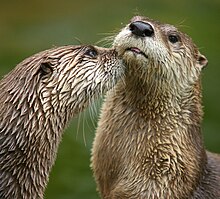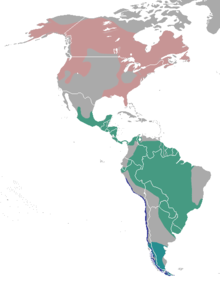Lontra is a genus of otters from the Americas.[1]
| Lontra | |
|---|---|

| |
| North American river otters (Lontra canadensis) | |
| Scientific classification | |
| Domain: | Eukaryota |
| Kingdom: | Animalia |
| Phylum: | Chordata |
| Class: | Mammalia |
| Order: | Carnivora |
| Family: | Mustelidae |
| Subfamily: | Lutrinae |
| Genus: | Lontra Gray, 1843 |
| Type species | |
| Lutra canadensis Gray, 1843[1]
| |
| Species | |
|
L. canadensis | |

| |
| Lontra range | |
Species
editThese species were previously included in the genus Lutra, together with the Eurasian otter, but they have now been moved to a separate genus. The genus comprises four living and one known fossil species:
Extant species
edit| Common name | Scientific name and subspecies | Range | Size and ecology | IUCN status and estimated population |
|---|---|---|---|---|
| North American river otter | Lontra canadensis (, ) Seven subspecies
|
North America |
Size: Habitat: Diet: |
LC
|
| Southern river otter | Lontra provocax (Thomas, 1908) |
Chile and Argentina |
Size: Habitat: Diet: |
EN
|
| Neotropical otter | Lontra longicaudis (Olfers, 1818) Six subspecies
|
Central America, South America and the Caribbean island of Trinidad |
Size: Habitat: Diet: |
NT
|
| Marine otter | Lontra felina (Molina, 1782) |
South America |
Size: Habitat: Diet: |
EN
|
Extinct species
edit| Scientific name | Common name | Distribution |
|---|---|---|
| †Lontra weiri | Weir's otter | Pliocene North America[2] |
References
editWikimedia Commons has media related to Lontra.
Wikispecies has information related to Lontra.
- ^ a b Wozencraft, W. C. (2005). "Order Carnivora". In Wilson, D. E.; Reeder, D. M. (eds.). Mammal Species of the World: A Taxonomic and Geographic Reference (3rd ed.). Johns Hopkins University Press. ISBN 978-0-8018-8221-0. OCLC 62265494.
- ^ Prassack, K.A. (July 2016). "Lontra weiri, sp. nov., a Pliocene river otter (Mammalia, Carnivora, Mustelidae, Lutrinae) from the Hagerman Fossil Beds (Hagerman Fossil Beds National Monument), Idaho, USA". Journal of Vertebrate Paleontology. 36 (4): e1149075. Bibcode:2016JVPal..36E9075P. doi:10.1080/02724634.2016.1149075. S2CID 87404097.